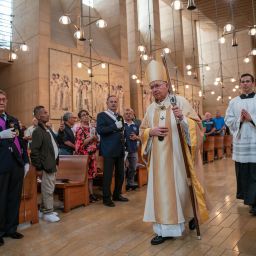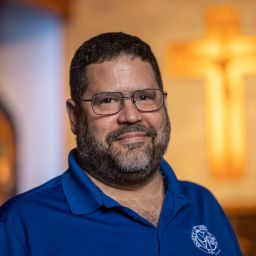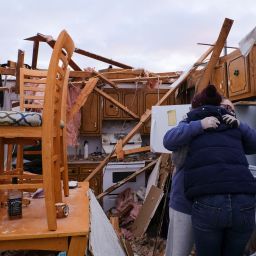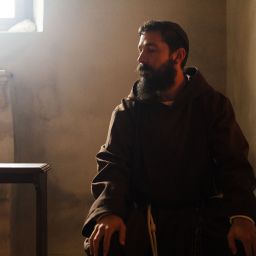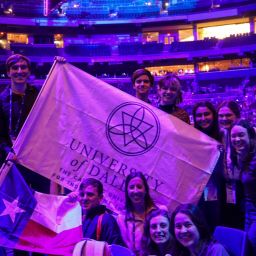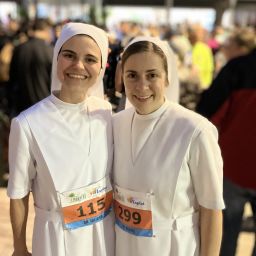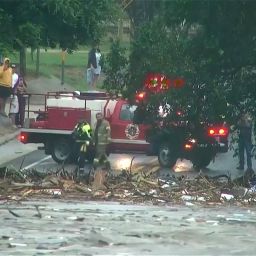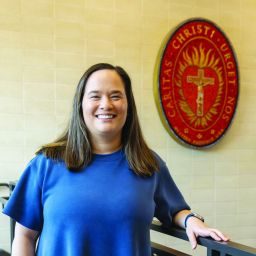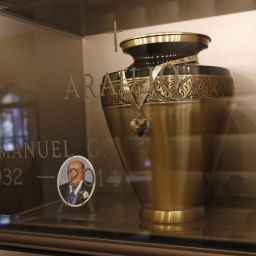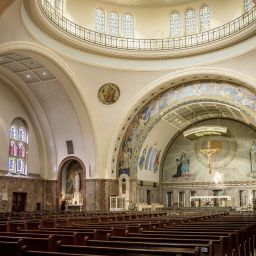By Gina Christian
OSV News
The University of Notre Dame has selected a new president who said he hopes to position the school as an “ever-greater engine of insight, innovation and impact.”
The Catholic university’s board of trustees announced Dec. 4 that Holy Cross Father Robert A. Dowd has been named Notre Dame’s 18th president, effective July 1.
Father Dowd — an alumnus of Notre Dame, located in northern Indiana, and an Indiana native himself — has since 2021 served as the school’s vice president and associate provost for interdisciplinary initiatives. He also is an associate professor of political science, a university fellow and trustee, and religious superior of the Holy Cross community at Notre Dame.

Father Dowd will succeed fellow Holy Cross priest, Father John I. Jenkins, who said in October that he had decided to step down at the end of the 2023-2024 academic year after serving as president for 19 years — a tenure that was marked by both significant advances in the school’s development and occasional controversy.
Father Jenkins described his successor as “an accomplished scholar, a dedicated teacher and an experienced administrator,” as well as “a faithful and generous priest.”
“He will lead the university to being even more powerfully a force for good in the world,” said Father Jenkins in the announcement.
Jack Brennan, chair of Notre Dame’s board of trustees, said in the university’s Dec. 4 statement that Father Dowd was “an ideal person to lead the university into the future,” given “his character and intellect … broad academic and administrative experience” and “deep commitment” to Notre Dame.
Father Dowd said in the statement that he was “deeply humbled and honored by the board’s decision,” as well as “grateful for Father Jenkin’s selfless and courageous leadership for almost two decades,” which “positioned the university extremely well in every way.”
“We will build on those efforts,” said Father Dowd in the statement. “Informed by our Catholic mission, we will work together so that Notre Dame is an ever-greater engine of insight, innovation and impact, addressing society’s greatest challenges and helping young people to realize their potential for good.”
Father Dowd graduated from Notre Dame in 1987 with a bachelor’s degree in psychology and economics, and entered Moreau Seminary — the major seminary for the Congregation of the Holy Cross — shortly thereafter. Following his 1994 ordination, he worked in campus ministry at Notre Dame, serving as associate rector of the Basilica of the Sacred Heart and as an assistant rector in one of the university’s residence halls.
Having served in East Africa for 18 months while in seminary, Father Dowd earned a master’s degree in African studies in 1998 and a doctorate in political science in 2003 from the University of California, Los Angeles.
He joined Notre Dame’s political science faculty in 2004, with his research focusing on how Christian and Islamic religious communities impact support for democratic institutions, particularly in sub-Saharan Africa.
In his 2015 book “Christianity, Islam, and Liberal Democracy: Lessons from Sub-Saharan Africa,” published by Oxford University Press, Father Dowd stated his research found that “religious diversity has prompted religiously inspired support for a liberal democratic political culture,” one “characterized by social tolerance and civic engagement” — a conclusion that countered other analysts’ claims that religious diversity was an obstacle to liberal democracy in developing nations.
Along with his research and current roles in Notre Dame’s executive administration, Father Dowd oversees several entities at the school, including the Center for Social Concerns, DeBartolo Performing Arts Center, the Fitzgerald Institute for Real Estate, iNDustry Labs, the Institute for Educational Initiatives, the Lucy Family Institute for Data and Society, the McGrath Institute for Church Life, the Notre Dame Technology Ethics Center, the school’s Office of Military and Veterans Affairs and ROTC (Reserve Officers’ Training Corps) programs, and the Raclin Murphy Museum of Art.
Notre Dame’s presidents are chosen by trustees from among the priests of the Congregation of the Holy Cross, which founded the school in 1842. The school’s governance was transferred in 1967 from the congregation to a two-tiered board of lay and religious trustees and fellows.
Under Father Jenkins’ leadership, Notre Dame saw significant growth and expansion, particularly in its research initiatives, global engagement, student diversity and financial resources. The school was admitted this year to the Association of American Universities, which represents the nation’s leading research universities. In addition, Notre Dame enjoys partnerships with a number of schools throughout the nation and the world.
At the same time, Father Jenkins faced criticism at points during his tenure. Following a lawsuit filed by the university, he applauded a 2017 Trump administration expansion of the religious freedom exemption from a 2012 U.S. Health and Human Services mandate requiring most employers to include contraceptives, abortifacients and sterilizations in their employee health plans. However, Father Jenkins opted to allow third-party administrators to provide such coverage, saying the “university’s interest has never been in preventing access to those who make conscientious decisions to use contraceptives,” but was rather “to avoid being compelled by the federal government to be the agent in their provision.”
In 2016, Father Jenkins decided to honor then-Vice President Joe Biden, a Catholic who supports legal abortion, with the Laetare Medal — the oldest and most prestigious award for American Catholics. The decision was rebuked by Bishop Kevin C. Rhoades of Fort Wayne-South Bend, who said in a lengthy statement that it was “wrong for Notre Dame to honor any ‘pro-choice’ public official with the Laetare Medal.”
Similarly, a 2009 commencement address by President Barack Obama, part of the university’s custom of having U.S. presidents speak while in office at the school graduation, sparked backlash.

